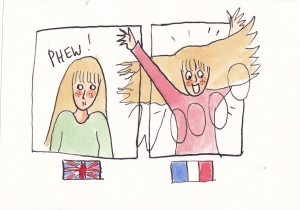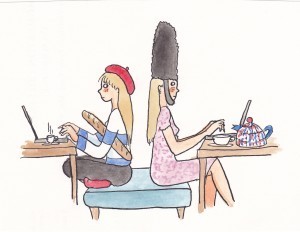Clémentine Beauvais's Blog, page 4
September 11, 2014
A Very Royal Book Birthday
Happy book birthday to The Royal Babysitters, which is coming out today with Bloomsbury and illustrated by Becka Moor!

Featuring Holly, Pepino and Anna
The Royal Babysitters is basically a secret ode to royalty and to the benefits of earning money through hard work from a very young age. Yep, that’s me, monarchy-worshipping and dirty capitalist all the way.
It’s all about little Anna and Holly Burnbright, who are not so happy with their forced staycation (they’re not very rich, because their dad disappeared years ago in the beak of a pelican, and their mum is a writer of ABC books paid 1 pound per letter). And it gets worse when the two sisters spot an advert for an incredible Holy-Moly Holiday involving volcano scuba-diving and baby-elephant polo.
Therefore, they have to find a summer job to buy tickets to that holiday.
A summer job comes in the form of royal babysitting: it so happens that today is the King and Queen of Britland’s annual day of leave to the Independent Republic of Slough, and they need someone to look after their rather energetic princes. Anna and Holly are ideal for the job (well, they aren’t, but no one else wants to do it.) At the Royal Palace they meet the charming little Prince Pepino, who’s not exactly the bravest prince in the world but has a cool felt-tip-drawn watch on his wrist that always says it’s ice-cream time.
As if their job wasn’t complicated enough, King Alaspooryorick of Daneland, who’s always been jealous of the King and Queen of Britland’s indoor swimming-pool and cellar full of Francian cheeses, has decided that today is the perfect day for an invasion.
Will Pepino, Anna and Holly manage to repel the invasion?
Will all the princes survive?
Will the Royal Cow be refrigerated in time?
Will King Steve of Britland manage to jump from the highest diving-board at the swimming pool of the Independent Republic of Slough?
You will know the answers to all these stressful questions if you gift the book to a young human and then read it to him or her (doing a big voice for King Alaspooryorick, a little peremptory one for Anna, etc.; and making it sound animated and hilarious; I trust you are fully able to read a book out loud to a child in an interesting way, or else they might not find it funny and all my efforts will be ruined; so please do your best.)
You can even read the first four pages, look:
The second book in this perfectly nonsensical series will be called The Royal Wedding-Crashers, and will come out in April 2015. In the meantime you may reread The Royal Babysitters a thousand times, or pick up the Sesame Seade series (DOUBLE PROMOTION BLOG POST ALERT).

Sesame lurking under the Royal Babysitters
Or plan your own invasion of some faraway land.
I will be touring some schools and doing some festivals to meet future readers of this extremely educational book in the next few weeks. Full report to follow!
Clem x
August 28, 2014
Back to the desktop
Hello again, after a rather long break. This summer, I had fake holidays (=conferences) and real holidays (= real holidays). After two months of June and July spent working quite intensely on my monograph (the final revisions of which I submitted at the end of July), I went to the International Bakhtin Conference in Stockholm at the end of July, disguised as a Bakhtin scholar (which I’m not). There, I was the discussant at a panel given by my colleagues Maria Nikolajeva, Eve Tandoi and Faye Dorcas Yung on Bakhtinian approaches to children’s literature.

Awful place for a conference.
The highlight of the conference (apart from a textbook example of mansplaining I had to endure from a charming middle-aged professor) was the re-enactment of Mikhail Bakhtin’s doctoral viva, in which Maria played one of the external examiners. All the genders were switched, so Bakhtin himself was played by a young female academic with absolutely spot-on facial expressions of weariness and annoyance at the objections s/he was receiving.
Can you imagine having your PhD viva re-enacted? Yeah, me neither. But then it certainly wouldn’t make such good drama. Despite Maria’s character’s insistence that ‘to refuse Comrade Bakhtin the title of Doctor would be ridiculous’, poor Mikhail only managed to get the equivalent of a Masters’, in part because of the non-political nature of his work. A female comrade from the audience (played by a male British Bakhtin scholar) had indeed bemoaned the shocking lack of references to Marx and to Lenin in the analysis of Rabelais.

The re-enactment (with “Bakhtin” in the middle, and Prof N. in yellow)
Stockholm was staggeringly hot – pretty much 30 to 33 degrees the whole week. I actually fell asleep in an aftenoon talk, which had never happened to me before. But this meant that we got more than the usual side-tourism done – we even swam almost everyday in the beautiful bay, including on the Baltic Sea side which was petrifyingly cold.
I then went on actual holiday. When you’re an academic, talking to other academics, there’s a kind of understanding that if you’re going away somewhere nice, it’s probably for a conference. So if someone tells you, ‘I’m going to Hawaii tomorrow,’ the correct reply is, ‘What’s the conference going to be about?’. Not so in August, when I managed to spend a week in the tiny village in the North of France where we have a small holiday house, and then a full two weeks in Rome.

North

and South
My Roman holiday wasn’t tourism-only, though, as I’d decided to spend every afternoon working on the first draft of my next French teenage novel, and thankfully managed it. I’d been working on it for over a year, but very on and off – contrary to my English work, in France I don’t get contracts before I write a book, which means no deadlines – so writing them is always very low on my to-do list, even though I enjoy it a lot. This new novel is, contrary to my first two (very grim) YA books, a comedy.
What now awaits me as I’m back in Cambridge is a daunting to-do list, both on the fiction side and on the academic side. I’ve got several ‘Revise and Resubmit’ or ‘Revise with major corrections’ articles to, well, revise and resubmit. I have to do the index for my monograph. I’ve been contracted for two more books in the Royal Babysitters series with Bloomsbury, which I need to write between now and April.

The first one is already in my house, making friends with its older sibling Sesame
The first book, The Royal Babysitters, is coming out on September 11th and I’m going on a small promotion tour with a number of schools. I’m also doing a few festivals here and there, and going to Lake Leman next week for a big book fair, this time mostly for my French books.
I’m also bracing for what is going to be a heavy year in terms of teaching. I’ve taken on many new lectures, including in the fields I’m now branching into – sociology and philosophy of childhood and education – and I will also be teaching Creative Writing courses (on children’s fiction) at the Institute of Continuing Education in Cambridge. I’ll also keep supervising, though probably not as much as the years before as my teaching load is too big already. I will probably miss it a bit, as I’ve been enjoying supervising undergraduates more and more, and was particularly spoiled last year with some very bright, very motivated students.
I hope you all had a nice summer too, and leave you with what was, to me, the most stupefying thing in Rome – and a reminder not to forget about sensuality and beauty while in the midst of frantic term-time…

Bernini.
July 16, 2014
Royal Cover!
Hurrah! We’ve got a cover for The Royal Babysitters! and it’s as yellow as royal jelly, and as energetic as the story inside. I’m absolutely thrilled with it – look at that!
 All thanks to the great Becka Moor and the Bloomsbury designers…
All thanks to the great Becka Moor and the Bloomsbury designers…
It’s got everything a good cover needs: a prince with ice-cream cones stuck behind his ears, a very large number of royal babies, a robot sea monster, a snake and a zeppelin piloted by a mad king. Therefore, I call it an extremely successful cover.
Since it’s been approximately a very long time since I told you about this series, here’s a reminder of the story:
In another world not quite at all like our own, though very like it in other respects, but mostly not, although a little bit, the King and Queen of Britland are going on their annual day of leave to the Independent Republic of Slough. As a result, they are in urgent need of a royal babysitter for their two three four numerous little princely toddlers. Coincidentally, Anna and Holly Burnbright are in urgent need of two thousand pounds to go on an intergalactic holiday they’ve seen advertised in the newspaper. Great summer job opportunity, no?
Uh oh, it’s also the day King Alaspooryorick of Daneland has chosen to invade Britland…
The Royal Babysitters is out in September and will be followed by The Royal Wedding-Crashers in April, when Anna, Holly and Prince Pepino will be off to Francia.
And yes, I promise, I’ll update this blog soon again. I’ve been revising my monograph. I might talk about that, because it’s so thrilling it’s almost worthy of its own Buzzfeed article.
Clem
June 25, 2014
Productivi-tips
Last week I wrote a blog post deploring the fact that I couldn’t write slowly. In response, two of my friends suggested I blogged about how to be ‘productive’. I’m a bit ambivalent, since, as hinted in that blog post, ‘productivity’ has a dark side. It can be efficiently generated by the cultivation of guilt, worry about the future and insecurity in children from a young age (I’m looking at you, French educational system), as well as by inordinately high standards.
So my immediate sarcastic response was: Tip number one: set yourself irrationally high goals, self-flagellate every time you don’t work enough to attain them, find people who are much better than you and mull over how superior they are, and for good measure, add the threat of never finding a job. Your productivity will rocket, I promise.
Well, let that be a disclaimer: even though this is a ‘tips’ blog post, there are issues with ‘tips’ about productivity, just like there are issues with ‘tips’ about losing weight, for instance.
But here are a few things that I do find genuinely useful in increasing productivity, that is to say, in my case, getting (preferably good) words on the page, whether academic or fictional, and making sure they get published (i.e. editing, revising, referencing, etc); and doing teaching-related work.
Switching off the Internet entirely
Just as I’m writing this, a little (1) pops up on my Facebook tab. I have to check what it is, because it could be someone tagging a picture of me drunkly lap-dancing in a bar. Let’s see. No, it’s fine, it’s just someone I friended in 2008 mass-inviting all his Facebook acquaintances to sponsor his half-marathon on a space hopper. I’m never going to sponsor him, but I still read the whole description and end up wikipediaing the charity he’s space-hopping for, which knits socks and scarves for yellow-bellied marmots. I suddenly remember I have a blog post to write, but now a little (1) has appeared on the Outlook tab…
Sorry, what? Oh yes – the Internet. Let’s not write that blog post online – too distracting. Write it in a Word document instead. Internet can stay open behind Word. Oh no it can’t, because some idiot at Microsoft thought it would be an excellent idea to make Word vaguely translucent at the top, which means I can still distinguish the little (1)s through a half-hearted vapour of pixels.
Solution: turn it off altogether with Cold Turkey (SelfControl for Mac users). I couldn’t have written anything in the past two years without Cold Turkey. It didn’t even get a mention in my thesis acknowledgements, because I preferred to pretend that real humans such as my supervisor, friends and family were more responsible for its completion, which is a lie, however much I love them.
 Those pieces of software only block the websites you want them to block, which means you can still use JStor and Project Muse, where procrastination opportunities are few (until you start typing up your own name to see what comes up and this does).
Those pieces of software only block the websites you want them to block, which means you can still use JStor and Project Muse, where procrastination opportunities are few (until you start typing up your own name to see what comes up and this does).
Pomodoroing through multiple projects
I do this when I work on very many projects that are all at different stages of development, because that’s when I’m most at risk of using the exciting ones as excuses to procrastinate on the others. The Pomodoro technique basically states that you should set yourself short spans of time for work, interspersed with breaks. Strictly speaking, it’s supposed to be 20 minutes, but that’s too short to do anything constructive in academic or fiction writing.
I make myself work generally for an hour or an hour and a half on many projects everyday, strictly interrupting the one I’m doing when time’s up (yes, even in the middle of a sentence) to start work on the next one (or take a break).

The pictures in this post are beginning to make this look like a recipe blog
Breaks can be used to check and reply to email, though it’s much better if you can actually force yourself not do anything at all.
I use the Pomodoro technique only when I’m feeling overwhelmed by the quantity and variety of different projects. It’s also much easier during student holidays, when there aren’t too many meetings, supervisions and essays to mark.
The good thing about this technique is that you never work long enough to get bored of the projects. If anything, it makes you frustrated when you have to stop – which means that the next day, you’re happy to find that piece of work again.
Taking on more work, or setting earlier deadlines.
I find that productivity augments, rather than declines, when I’ve got more to do. This is, in part because although I can (on good days) focus intensely on writing or research for up to six or seven hours, it’s extremely rare when I can have that focus for one project. Paradoxically, taking on more projects and making sure you’ve always got one or two deadlines soonish makes me achieve more and feel happier.
Keeping a strict and very subdivided to-do list.
I list everything, even things like ‘reply to X’s email’ if I know it will take me more than 3 minutes to compose. If I have 20 undergrad essays to mark, I’ll list the names of all 20 people and cross them out as I go along. Purely psychological, of course, but those manageable tasks give the impression of being productive, which leads to actually being productive.
I also have 4+ separate to-do lists corresponding to different domains (fiction, admin, research, teaching, etc.), which avoids clutter. My to-do lists are on (virtual) post-it notes on my desktop, like (virtually) everyone else I know.
Doing either work or leisure activities
Wait but Why says it perfectly: there are two types of good weeks: days when you achieve something that ‘improves your future or that of others’ (even in small ways), and weeks of pleasure, leisure and enjoyment. Both at the same time makes for an ‘ideal’ week, which is rare.
And in-between, there’s a wearisome kind of activity, where you know you’re not actually having any fun, but you’re not doing anything particularly valuable either. This is the case, for instance, if you spend most of a day half-heartedly writing a few sentences, checking email, marking half an essay, checking the news, reading half a paper, checking the weather, etc. It’s tiring and makes you feel gross, while both real work and real leisure makes you invigorated and happy.

Real leisure: walking around the Cambridge Botanic Gardens
Picking the right times for small projects or admin tasks
It’s tempting to get small tasks or long tasks that don’t take much brainpower out of the way (i.e. filling in forms, doing tax returns etc.). But then you just end up wasting valuable energy, and possibly spending too much time on them out of a semi-conscious desire to procrastinate work on important stuff. Again, I find it useful to time those important but boring activities strictly, and stick them at moments of the day when you know you won’t be very switched-on anyway.
Using up as much available time as possible.
It’s hard to focus on anything when you know you’ve got to leave in 10 or 20 minutes, but with some tasks it’s entirely possible. I wrote most of this blog post in chunks of 5 or 10 minutes. I have a number of tasks on my to-do list that I know I can do in instalments, quickly dipping in and out when needed.
Sacrifice some things.
For instance, this blog and my French one. I don’t care (much) if I don’t have the time to deliver the weekly Wednesday post.
I’d be curious to hear what you do to increase productivity, and/or take issue with such blog posts as this one on ideological grounds.
June 15, 2014
Writing Slowly: Or, Investing in Research & Development
Two Fridays ago at Homerton College, we had a day-long symposium on children’s poetry. It was supposed to mix creative and academic approaches, so there was an hour-and-a-half, wonderful poetry-writing workshop by Redell Olsen, who is currently the Judith E. Wilson Poetry Fellow at Cambridge.
We sat down in the orchard, and Redell gave us a series of writing exercises. Of course it involved writing, but it also involved taking in the space around us, the noises, the smells, the feel of the grass under our legs. Despite the brevity of the writing exercises, there was a kind of enforced patience in the workshop; an awareness of the world around, before and during the writing, an attention to detail, a weighing-up of possible options.

Homerton, under the sun
A lot of playfulness, too. Redell encouraged us [Green Party members may skip the next sentence] to pick up a fresh sheet of paper with each new exercise, and thus make each try just that – a try – and not a finished piece. Disposable writing, but not unimportant writing. Each try brought us closer to a personal mapping of the space we were in, of the sensations that it brought, and of their possible translations into literature or poetry.
I found this workshop truly revealing. I’m not a poet and I didn’t produce anything of any particular literary merit, but it shocked me to realise how fruitful it was to be able to write slowly, with breaks and pauses, with moments of observation.
In my two jobs – academic and fiction-writing – I can’t write slowly. I mean this in all the definitions of ‘can’t’: I seem to be organically unable to; it wouldn’t be manageable anyway even if I could; and I’m not ‘allowed’ to.
I suspect my inability to write slowly comes from a lifelong cultivation of speed-writing. Writing fast puts you at a clear advantage at school and at university, and it’s an essential skill as a young academic since we have to publish so much in order to be employable.
The habit is so deeply-rooted that I can’t even remember a time when I wrote slowly. At school I always finished exams early, sometimes an hour before the end. Whether for academic or fiction-writing, I’ve never missed a deadline. You’re very happy with this productivity until the rather sinister realisation creeps in that you’re writing fast out of dutifulness or anxiety, rather than enthusiasm or passion.

Mini-me, already annoyed at being interrupted in the middle of writing.
Positive reinforcement: being ‘prolific’ is a compliment; publishers want you to write a lot; in academia, your list of publications is your best asset. The faster you write, the more you produce; if your work is deemed of good enough quality, and there’s a lot of it, you will elicit admiration and praise. That’s enough to prevent you from questioning whether you could write very well rather than just well if only you slowed down a bit.
Anyway, even if you do start wondering about that, it’s too late. It’s a vicious circle: the more you produce, the more you must keep producing; and if people find your work satisfactory and are simply concerned with how much of it you can produce, there is no incentive to experiment with writing other things, or writing more slowly. So you just keep going at an increasingly insane pace.
You might feel you’re plateauing at some point, and that the quality of your work is more or less always the same. But as long as it’s not actively decreasing, and that people are happy – well, you just keep writing as fast as usual, if not faster.
It gives rise to a kind of academic or literary Fordism whereby you get better and better at spotting superfluity in your own writing, and cutting down everything you spend too much time on. You become extremely efficient, sure, but the time you manage to save is never truly earned back for Research & Development, so to speak – it gets immediately reinvested in Production.
In this you are encouraged by Twitter, Facebook and tales of who got hired where thanks to how many publications. Writing is your job, so you must produce writing; if there’s no writing, you’re not a writer or a researcher.
Writing slowly, experimenting with writing, gradually becomes ‘disallowed’, simply because you stop considering it as work. It’s a free-time activity. And I, like many people, have very little free time. I have a full-time research position, but I take on too much teaching, like everyone else, so I don’t do research 100% of my work time. And then my actual free time is mostly taken up by fiction-writing, which, of course, is itself mostly taken up by checking layouts, editing, liaising with editors, checking roughs – so, not-writing. And of what little is left I need to use a lot to do fake free-time-activities which are in fact linked to my two jobs, such as reading, writing blog posts, doing school visits, etc.
Writing slowly and experimenting with writing is just something I can’t do anymore. I would love to claim that the poetry workshop changed my life for the better, that I’ve now decided to slow down and to take the time to write and to play around with different academic and literary styles, but that’s not the case at all.
I just don’t have the possibility to do so ‘right now’, because I’ve got to check layouts for a British book, edit another British book and a French one, write two YA novels (English+French), finish revising my monograph, finish the article I’m currently working on, write another 2 before the end of July (French+English), and somehow I also need to fit in writing another children’s book before the end of the summer.
So I’ll write slowly ‘when I have the time’, which is, as it is for most people, never. My investments in Research & Development dwindle and dwindle and dwindle – but the production line is going well, thank you.
Clem
May 28, 2014
What’s your academic diet?
Of course, we’re all vultures of a kind, mostly feeding on previous bodies of work. But academics do have very varied diets. Which is yours? Take the test and discover what kind of scholarly gourmet you are.
1. Which thinker would you never have dinner with?
a. Judith Butler
b. Martin Heidegger
c. Harold Bloom
d. Friedrich Hegel
2. Which quotation gives you the most food for thought?
a. “The safest generalisation we can make about Western philosophy is that it is a series of footnotes to Plato.” (Alfred North Whitehead)
b. “If emotion without reason is blind, then reason without emotion is impotent.” (Peter Singer)
c. “Art is anything you can get away with.” (Marshall McLuhan)
d. “Declaration of principle, pious wish and historical violence of a speech dreaming its full self-presence, living itself as its own resumption; self-proclaimed language, auto-production of a speech declared alive, capable, Socrates said, of helping itself, a logos which believes itself to be its own father, being lifted thus above written discourse, infans (speechless) and infirm at not being able to respond when one questions it and which, since its “parent[’s help] is [always] needed” (ton patris aei deitai boithon—Phaedrus 275d) must therefore be born out of a primary gap and a primary expatriation, condemning it to wandering and blindness, to mourning.” (Jacques Derrida)
3. Which of these concepts or theoretical ingredients can you really not stomach?
a. Intersectionality
b. The animal-machine
c. The Great Conversation
d. Dialectic
4. Where do you find your favourite intellectual recipes?
a. Why, in books. Where else?
b. You listen to people that no one will listen to.
c. You have an app or two. And you follow a number of specialised blogs. You especially like those that explain things in comic form #yaybubbles
d. What recipes?
5. What are you currently cooking up?
a. A long monograph for a respectable academic press.
b. An impassioned TED Talk on how the implications of your work are both humbling and world-changing.
c. An article for an edgy online journal.
d. You’re not too sure. This morning you thought about how ‘hoovering’ could become a new concept. It would be interesting. You’re currently idly drawing a network of other concepts around it, on a napkin at a café.
Bonus question:
7. How do you like your eggs in the morning?
a. Raw.
b. Can I have tofu instead?
c. You don’t, unless they’re quails’ or ostriches’ eggs. Or Easter eggs. Anything else is b-oring.
d. Very, very scrambled.
Now count up your points! And prepare for revelations about your academic diet.
You got a majority of As.
You’re on an academic paleodiet. You’re the proud caveman of the Ivory Tower, buried under piles of yellowing paper, by the warmth of a good fire. None of those new low-fat methods, highly processed theories, interdisciplinary recipes and artificially-coloured concepts: you do things the old-fashioned way. Old recipe-book-writers knew what they were doing! And who cares if they were mostly white men. But times are changing, and for the worse: you keep grumbling that few people want to take a bite of your stuff when it contains your favourite mammoth concepts.
You got a majority of Bs
You’re an academic vegan. Endowed with supernaturally stretchable empathy, you’re always looking for the next free-range theory, the next concept not tested on animals, and you strive to create environmentally friendly versions of previous models. You’re highly suspicious of some traditional ingredients: reason, in particular, which, albeit a necessary base to your own theoretical cooking, has led astray many a philosophic chef. You mean to change the world, one homemade dish at a time. You believe in outreach, in nourishing the world: everyone should get a taste of your theories.
You got a majority of Cs
You’re an academic omnivore, with a clear preference for what others consider junk food. From media studies to children’s video games, from the science of Twitter to electro-pop-music theory, you just love that industrial flavour. Of course, you know all the cool kids (at least on Facebook), and you meet up for conferences which are so buzzwordy that they make it into the Featured page on Google news. The academic paleodieters hate you, though you sometimes pretend to them that you don’t actually have a taste for those things you study; you just find them worthy of attention, that’s all…
You got a majority of Ds
Is it molecular gastronomy? Is it Thermomix addiction? Is it simply that of someone who, erm, isn’t too sure how to cook? Difficult to say. Basic ingredients become quite unrecognisable – indeed even, some would say, unpalatable – when you’re in command. You keep inventing new implements, too. You are, however, a bit of a poet; you talk a lot about your ideas in a mouth-watering fashion before revealing them. Then you lift the cloche, and the deconstructed, disintegrated, dizzy concepts, not too sure whether they’re a wave or a particle, have a tendency to dissolve. It certainly looks, smells and tastes impressive, though.
May 21, 2014
Publishing Children’s Books in the UK vs. in France
I spend half of my life complaining about how difficult it is to write children’s books for the French market, and the other half complaining about how difficult it is to write children’s books for the UK market. The happy corollary to this is that I spend half of my life praising the French market, and the other half praising the UK market.
Several people have asked me to write about the differences between UK and French children’s publishing, and what it means for writers (they might have asked me this so I get it out of my system, bored as they are of hearing me going on and on about it). It’s true that the two systems are extremely different, and for someone who attempts to write children’s books for each market, and to have a writing career in both countries, it’s a bit of a schizophrenic exercise.
‘Literariness’ versus ‘wide appeal’
Writing in English for the UK market means, to me, a certain compromise between ‘literariness’ and ‘commercialness’. This isn’t to say that French publishers don’t care about sales – of course they do – but I have never been asked by a French publisher to make a book or book proposal more commercial. However, in the UK market, wide appeal is absolutely crucial.
This is in part because writing for the UK market means writing, potentially, for all the anglophone markets – and, hopefully, for many others. We are asked to consider not just if British kids will like the books, but also if American, Australian, South African, and also German, Spanish, Turkish, Korean and Thai kids will like them too. Foreign right sales are hugely important and it is expected that a book should be sold abroad.
In France, for most publishers, foreign right sales are a lovely bonus for a children’s writer, but they’re something to celebrate, not something you really expect.

A comparative study of French and English reactions to foreign right sales.
Money matters
As a result, what you can expect to earn is radically different. People don’t always believe me, but the difference between a French advance and a UK advance, for a children’s writer like me, is quite literally 1 to 10. Being a full-time children’s writer in France means writing sometimes dozens of books a year and doing scores of events. Being a full-time children’s writer in the UK, in terms of income, is much, much more comfortable (though by no means ideal, I hasten to say).
Other things differ drastically. In the UK, after your first book, you generally get an advance before you’ve written the whole book. None of that in France, where you damn well write the damn whole book before pitching it to your publishers, and they might very well be like ummm… no. Sorry about the year of your life you spent writing it.
‘Faithfulness’ to publishers
Writing dozens of books a year requires having different publishers, and France is much more tolerant of this practice than Britain. Here in the UK, having more than one publisher isn’t ideal; in France, few children’s writers (at my level) have the luxury of being ‘faithful’ to one house. Of course, we’ve got a reputation for that kind of thing in matters of love too, so maybe that’s not surprising…

French author flirting with several publishers
Agents
Agents are a huge difference between the UK and France. In France, literary agents basically don’t exist; sporadically, you’ll hear that ‘they’re coming now!’ but actually… they aren’t. Writers have to struggle against editors all the time to negotiate contracts, get advances, get paid. It’s a bit of a nightmare, and something I’d much rather avoid.
In the UK, the possibility of having an agent is an absolute blessing – though I fully understand that many authors prefer to fend for themselves, I relish the presence of an intermediary between me and the publishing houses.
Political content of children’s books
Another, tricky difference: ‘radical’ children’s literature and controversial nature of the books’ content. UK people don’t always believe me, but genuinely – French children’s literature is much more radical. Much more racy, much more politically incorrect, much more politically committed, much more uncomfortable.
My French books, for most of them, are unpublishable in the UK, especially my YA books, because they would have to be readjusted for adults. Similarly, younger books can have darker and scarier content. Ambiguity, especially in endings, is accepted much more easily in France.
This is not due to the fact that editors are squeamish in the UK, but rather that they are worried that the book might be boycotted, banned, blacklisted by prescriptors. There’s a constant desire to appeal to the greatest number – and to avoid at all costs upsetting the adult mediators – and this means controlling the ideological content of the books much more.
Branding and promotion
In the UK, author ‘branding’ is hugely important – and it also means that it’s less easy to move between age ranges or genres. In France, I can publish a funny picturebook one month and a YA novel about revenge porn the next. But each book will reach such different audiences, and so randomly, that I’m unlikely to be recognised in either of the two markets.
Obviously, France is a much smaller pond, too: it’s relatively easy to become well-known, at least by name, and especially now that blogs and Facebook (much more than Twitter) are so popular among writers and illustrators. Being a debut UK author means streaming through a torrent of tweets from anglophone writers around the world, and it’s quite a daunting experience.
On the other hand, being a debut author in the UK or US is celebrated – you get a press release, a launch, some attention, and a lot of help from publishers to find events. In France? it’s nothing special. You have a book out. Youpi.
In short…
Neither situation is, of course, entirely ideal, but neither situation is entirely bad either. I love the fact that, in France (and with my main publisher Sarbacane) I can write about pretty much whatever I want. In the UK, I love the fact that my books are more widely read, and that there is so much work done by the publisher to promote them and sell them abroad. I also enjoy the additional money – sure; but it comes at a cost, too: that of compromising on ‘literariness’ or on ‘what I want to write’.
This is why I’m keeping up (or trying to keep up) writing on both sides of the Channel, and so far it’s brought me many more pleasures than disappointments.
May 7, 2014
Why Writing Is Like Everything Else
I’ve been reading blogs on writing and on publishing for more or less eight or nine years now, and I think that one of the most important things I’ve learnt from this daily blog-reading is the following message:
Writing is, pretty much, more or less, to some degree, basically like everything else.
See for yourself: here’s a small selection of things that writing is like.
To begin with, writing is very much like cooking. In fact, it’s so much like cooking that many different people have different views on why it’s exactly like cooking; however, others would argue it’s closer to baking, and I mean a cake, though apparently it can be much more precise than that: it’s in fact exactly like baking muffins. While you’re busy being a domestic god/dess, you might as well know that writing is also exactly like crocheting or knitting. You prefer shorter needles? No problem! Writing is pretty much like sewing too. When Rex starts yapping that it’s time for his morning walk, you can also do that productively, because writing is like walking the dog. Once you’re back, you might want to do a jigsaw puzzle, which is more or less what writing is, anyway. Don’t forget, once you’re back, to clean the floor, which, incidentally, is precisely what writing is like. You can even do it in your knickers, because writing is like walking around in your knickers. Then if the weather is still nice out, you might consider gardening; because gardening, and oh my goodness there are too many blog posts to list here, is absurdly similar to writing.
If you’re less of a domestic person and more of a multi-talented artist, here are some words of comfort. Writing is, in fact, very much like painting. However, if the blogosphere is to be believed, it’s even more like sculpting. Yes, all this vocabulary of carving out and polishing makes the analogy particularly strong: writing basically equals sculpting. Seriously, I promise you, it’s exactly like sculpting. Pottery, too, as you might have guessed. However, let’s not forget, while we’re talking about visual arts, that photography is also analogous to writing in many different ways. Sorry, what’s that? You prefer music? Well, you’re in luck: writing, as you might know, is just like singing. It’s also, to some degree, pretty much like playing the piano, though surprisingly enough it’s not like playing any other instrument, as far as my research has gone. If you’re more of a dramatic arts person, fret not, for writing is, thankfully, also like acting.
But wait, I hear you ask, what if I need some exercise in-between all these artistic activities that are exactly like writing? Fortunately, sports are the number one category of things that are like writing. In fact, sports in general are like writing. But there are also particular sports that are analogous to writing. I won’t bother you with all the literature on why writing is like running: it’s not difficult to see that many writers are constantly running, running, even running marathons. Some are also into other sports, and thanks to them I can report that swimming, dancing and skiing are also just like writing. Riding a bike is also part of the list of physical activities that are to some degree the same thing as writing. Do you prefer combat sports? Well, you might want to try judo, which happens to be a lot like writing. But some of you are more attracted to extreme sports, aren’t you – if which case, rest assured that hiking a canyon, rock-climbing, mountain-climbing, scuba-diving, and skydiving will provide much information as to what writing is like.
Boy, all of these active Duracell bunny writers are making me feel bad. Let’s go for a walk, for writing is obviously pretty much like walking. Then some stretches: yoga is a lot like writing. Yes, even in your leisure time, you can gather snippets of wisdom as to what writing is like. Fishing, for example, is like writing. Meanwhile, you might be rowing a boat, which thankfully is also like writing. Seasonal events should be taken advantage of: dressing up for Halloween appears to be pretty similar to writing. Making snowballs is so obviously like writing that it goes without saying. There is a lot of controversy around whether bowling is like writing: some say it is, but someone else says that writing is like golf, not bowling. Not sure I want to take sides in this debate, being equally bad at both. It’s also a shame I can’t drive, because apparently writing is like driving. But some people have tougher Sunday activities, and they might want to consider that the house they’re building, and their digging in the dirt, are also perfectly acceptable analogies for writing.
But of course writing is also a lot like much more romantic and sensual things. It’s like falling in love! And after this sweet event, you can gain relief from the idea that writing is like being in a relationship. This relationship entails a ton of sex, if writer-bloggers are to be believed: though Paulo Coelho himself argues that writing is like making love to a computer. It’s also like having sex with a beautiful woman. Consequences, consequences: as Mary Higgins Clark (and many others) report, writing is also like being pregnant. And after being pregnant comes having a baby, which thankfully is pretty much like writing. Don’t worry though: practicing medicine is very similar to writing, so you’ll be aroung like-minded people in the delivery room.
Feel free to share in the comments other things that writing is like. One thing’s for sure, though: blogging isn’t like writing. I don’t know how many books I could have written in the time I spent reading others’ and writing mine…
(nah, I love it, really.)
April 28, 2014
My Writing Process
Exceptionally this week, blog post on Monday rather than Wednesday. Because it’s the Rule.
Oh hurrah, a My Writing Process blog post! I have been tagged by the most ladylike Robin Stevens, whom by the way you should absolutely meet if you haven’t already, because 1) her upcoming novel is a detective-story-addict’s dream; 2) she has a lizard called Watson, and 3) she is Sesame Seade’s real-world counterpart. Also she is a lovely person and makes excellent cakes.
So the point of this My Writing Process blog tour is to answer three questions about One’s Writing Process, and then tag someone else. I don’t think there’s any curse if you break the chain (THIS DEAD CHILD SHALL VISIT YOU AT NIGHT) as everyone knows that you absolutely don’t need to scare authors into narcissistic self-reflectiveness; they will do it very willingly and respect whichever deadline you set them.
Here we go then:
1. What am I working on?
Not sure this question is inviting long explanations about my current research interests and/ or students’ essays I’m marking, so I’ll skip directly to fiction. I’m working on edits for a series with Bloomsbury, The Royal Babysitters and The Royal Wedding-Crashers, coming out October 2014 and April 2015. My other series, the Sesame Seade Mysteries, is finished – but I work a lot on promoting it by going to schools and meeting young readers.
I’m also working on my French books: a YA novel and a mid-grade adventure story, which no one cares about here you poor things, you are so missing out. But right now I’m pretty much done with everything I’ve been contracted to do. I’m therefore in the difficult situation of Looking For Another Contract.
2. How does my work differ from others of its genre?
The Sesame Seade Mysteries are funny and mysterious detective stories, but I’m quite proud of the fact that they don’t kill off the parents or make them inexplicably uninterested in their daughter’s whereabouts. The language also makes the series quite different from other books of the same kind that I’ve read, I think. A lot of the humour depends on the language.
God, is there any way of answering this question without sounding hugely pretentious and/or making sound like your colleagues are writing utter rubbish?
The Royal Babysitters and The Royal Wedding-Crashers are, I think, wackier than your usual funny/ adventure story for early readers. They were written to sound like I was constantly high on some kind of magical herb, but I promise I wasn’t. I’m even down to one coffee a day.
3. Why do I write what I do?
Because I’ve found a more or less happy middle between what I want to write and what publishers are willing to publish. This happy middle in France is very different to what it is in Britain. I like many things when I write fiction: I like humour, I like language, I like sarcasm, I like adventure, I like a bit of cruelty, I like political commitment. The two countries allow me to express those different likings to different degrees.
4. What’s my writing process like?
Completely erratic. I make time for it; time is never already there. Writing fiction is not my full-time job, so it comes after doing research, writing papers, marking students’ essays, supervising students, etc. And part of fiction-writing-time must be devoted to promoting books that already exist, doing school visits, replying to emails, blogging, etc. I end up writing very little.
Fiction-writing time is clearly separated from Actual Work Time by my moving to the sofa with the laptop as opposed to sitting at my desk.
I’m a planner. I make relatively strict synopses to which I generally stick. I abandon many book projects after just a few pages or chapters. I start a lot of things.
I hate editing and revising; it’s a big problem, because I also hate it in my academic work. As a result, my first drafts are often quite polished, because Writing-Me does everything she can to diminish Editing-Me’s future wrath.
I write quite fast once I get going, and I don’t get hugely attached to characters and stories any more. I’m always thinking of the next project. I’m more anxious about writing than I used to be.
Somebody or other said that there are two types of writers: those who like writing, and those who like having written. Sadly, I think I am in the latter camp. It’s not that I don’t like writing, but there’s nothing like the joy of a finished manuscript.
Julian Sedgwick, it’s your turn!
April 22, 2014
The Duchess of Cambridge’s Guide to Essay-Writing
Summer’s coming, undergradate and MPhil dissertations are due soon, and it’s time to get articles sent to journals before the August and September lethargy gives peer-readers even more excuses to take 6 months over reviewing our 7000-word pieces of genius research.
It’s also the right weather for the sempiternally worshipped Duchess of Cambridge (DoC) to properly dazzle the world with her impeccable figure and flawless sense of style, so I thought I’d corner her for an interview about how we can transfer her otherworldly sartorial perfection to our academic writing.
CB. Hello, Your Cantabrigian Highness! How was Australia?
DoC. It was ever so interesting. Among other things, I discovered that giraffes have even longer tongues than the men who watched the slow oscillation of my sister’s derriere at my wedding.

CB. Right… Tell us, pray, o eternal empress of chic – what tips from your wardrobe and attitude can we apply to academic essay- and article-writing?
DoC. Well, to begin with, we must all agree that the ideal outfit is perfectly fitted, but of a lovely bright or pastel colour.


CB. Indeed, you are not a fan of baggy tops and maxiskirts in fifty shades of browns and greys. What’s the tip here?
DoC. My dear, the ideal article is carefully trimmed to fit exactly the subject matter – no fluffy extras, no bits of fabric hanging out here and there, and rigorously no asymmetry. Be scissor-happy: as close to the body of the essay as you can be. No blurry tulle or misty gauze: use honest, clear, tangible fabrics. But to counteract this rather severe tailoring, allow yourself a generally bold, bright, youthful, sharp tone of voice. White and black are to be kept for important occasions: black for paradigm-shifting articles, and pretty, lacy white lies for academic reviews of your friends or colleagues’ latest books.
CB. All of this should be monochromatic ?
DoC. Well, I do like monochrome, but accessories will help you ensure it doesn’t end up being monochord. Allow yourself little deviations from the overall tone – but only where it matters. A nice little controversial quotation to top your introduction like a curly fascinator, an interesting clutch to set off a dull paragraph towards the middle of the essay.

CB. And a grand, lyrical, flashy conclusion?
DoC. My goodness, no! It would attract attention solely onto itself, to the detriment of the body of work. Conclusions should be like my shoes: very bland, distanced enough from the ground that they’re not flat, but certainly no platforms. Let the essay speak for itself and end sensibly.

CB. That’s helpful, Your Highness, but some people would accuse you of taking too few risks. Aren’t we going to end up with a rather classical style?
DoC. This is where another rule comes into play: hair should be down unless absolutely necessary. This will add unexpectedness, a sense of welcome playfulness, a certain je ne sais quoi of unpredictability. Structure and plan everything, but always leave something unprepared – something for the winds of inspiration to frolic around with.

CB. Erm what? Your hair is unprepared?
DoC. *coughs* Well, it’s prepared in a special way that makes it feel natural and unexpected when the breeze plays around with it. Think of it as your scholarly background – all that knowledge that you’ve accumulated over the years. Some of it is already present in your structure – you’re consciously integrated those sources, you know you’ll mention them at some stage. But the rest is still there, maintained, curled and trimmed by years of taking notes, rereading them, forgetting them. Not exactly unprepared, but let’s say, artistically free-floating. A flick of the wind and ta-dah! who knows which idea might come and kiss your cheek when you think you’ve got your whole argument sorted?
CB. What is it with knees? Why do you rarely show your knees?
DoC. Knees are like transitions between subparts. They do all the hard work, but they are aesthetically displeasing and lack grace. Try to conceal them whenever possible. That said, should an impolite gust of wind ruffle your skirt as you get down from an airplane, the effect can be quite alluring; use this tip sparsely, to showcase, for a brief moment, the strength of those solid hinges of yours.

CB. What can you tell us about handling our ideas?
DoC. Take inspiration from the way in which I artfully handle little Prince George to show him around to my people: from all different angles, and apparently effortlessly. It looks like a nine-month-old healthy baby isn’t at all too heavy for my impossibly delicate arms. Cultivate that style. Show all the facets of your ideas, trying to make it sound like it’s very easy to hold them for a long time in improbable positions.



CB. Is it always necessary to remind everyone of your status by constantly flashing your tacky diamond and sapphire engagement ring?
DoC. Yes, dear. It’s called a self-citation. You’ll see when you’ve got actual work to show for your importance in the field: you’ll refer to it absolutely all the time. You’ll find, in fact, that I’m being quite restrained, only alluding to my status in one place per outfit. Of course, you can’t do that yet, because you’re a nobody who hasn’t yet done anything worthy of unsubtle allusions.

‘I refer you to my previous work in the field’
CB. Thanks for that. A final question, Your Royal Youness. People like me have days when they have pimples, or scruffy hair, or really no wish to squeeze our feet into high heels. For some of us, it’s every single day. What can we do if we really can’t follow your example, o grand guru of demure fashion?
DoC. I’m not interested in such people. I’m sure they can find their own style guide to follow. Go ask Lady Gaga, I heard she coached Slavoj Zizek.
Thank you, tabloidal deity, for granting us half an hour of your busy schedule. She has now returned to the hyperactive nothingness of her royal duties, leaving us with some hope that we shall one day find true love, in the form of a permanent and salaried position, within some academic establishment. And perhaps we will soon parade, in front of a crowd of excited journalists politely complimentary colleagues, a cuboid baby freshly delivered by an academic press.
Clémentine Beauvais's Blog
- Clémentine Beauvais's profile
- 301 followers







